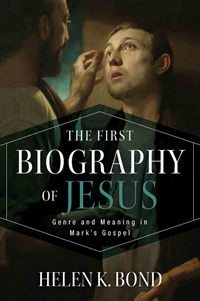Short Episodes Reveal the Character

Actions reveal one’s character, Aristotle once observed. Biographies in the ancient world were in tune with Aristotle on this for many of them simply gathered together anecdotes about a person worthy of emulation.
After her 120 page discussion of the Gospels as biographies – and all things biographical in the ancient world – Helen Bond (in The First Biography of Jesus) turns to the “first” Gospel, that of Mark, to show how reading it as a biography-in-context illuminates the Gospel of Mark. So true.
Aristotle’s point comes up first. This year I’ve read some biographies and it has become customary for biographers to diagnose the personality problems of their subjects. Mary Dearborn, for instance, delineates for all to see a number of issues in Ernest Hemingway. Ancient biographers didn’t so much do this. Instead, they let the actions speak to the reader/hearer and the audience then was to discern the character and identity of the person being “biographed” (my word). Instead of telling it was showing; some call this indirect characterization.
Plutarch avoided the major events and often focuses on trivial matters where he said one would find “signs of the soul.”
Pick up Mark, read 2, 3 or 4 chapters and you will see two things: short episodes and indirect characterization (mostly). We are left as readers to render judgment on “Who is this?” That’s what the Gospels do. They lead us to Jesus. They get us to discern and to decide about Jesus. That’s what “gospeling” is, too.
Furthermore, as biographers told stories about a hero they also were setting up the person as someone to be emulated. Time and time again as we read the Gospels we see Jesus acting and we hear a still small voice saying “go and do likewise.”
She includes nothing short of a condensed and shaped commentary on the biographical elements of the life of Jesus.
The baptism:
- We don’t hear about Jesus’ past, his parents, his education – we get the Father (God) announcing who this Jesus is. Jesus is God’s Son. This puts him in company, for the ancient readers of Greco Roman biographies, with the heroes of that world. He’s “adopted” by the Father to the Son.
- The Spirit enters into Jesus. This Jesus is God’s Son and now empowered by the Spirit.
- Jesus then is tossed out into the wilderness to be tested/tempted by the Satanas, and the focus remains on Jesus (not Satanas). Jesus’ vocation is being tested. Jesus withdraws to discern his vocation as God’s Spirit-empowered Son.

This is how we are set up to read the Gospel of Mark as a biography.
In the first half of Mark Jesus does miracles, which for Jewish listeners and anyone who knows Jewish scriptures, evokes Moses and Elijah etc. There were stories like this too in the Greco Roman world (Asclepius). The stories were entertaining and prompted wonder.
Jesus has cosmic power and authority. The Spirit empowered Son of God did wonders. But Mark connects Jesus to kingdom, and that means a theology of kingdom comes into play for the listeners of the Gospel. And Messiah!
The Jesus who is beseeched for these acts of miracle – healing, exorcising, curing – is one who is compassionate, who listens, and who attends to the needs of the desperate and demonized. He is, in Mark’s word, “compassionate.” He commiserates. That’s who Jesus is, that’s his character.
I could go on, and Helen Bond does go on, but she’s reading Mark as it should be read: Who is he?, that’s the question for the reader to this day.
Jesus Creed is a part of CT's
Blog Forum. Support the work of CT.
Subscribe and get one year free.
The views of the blogger do not necessarily reflect those of Christianity Today.


















